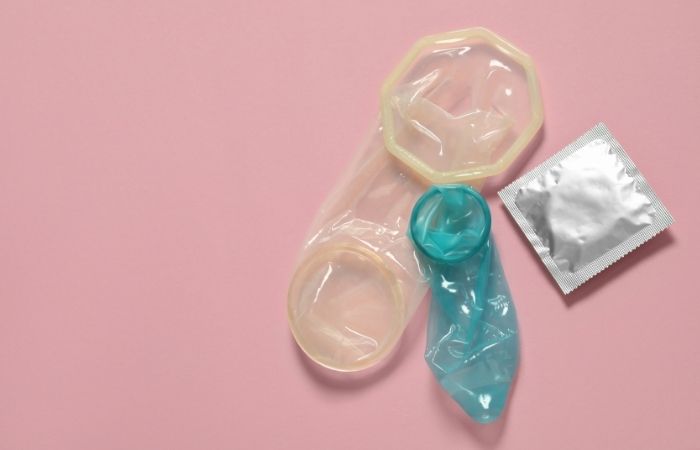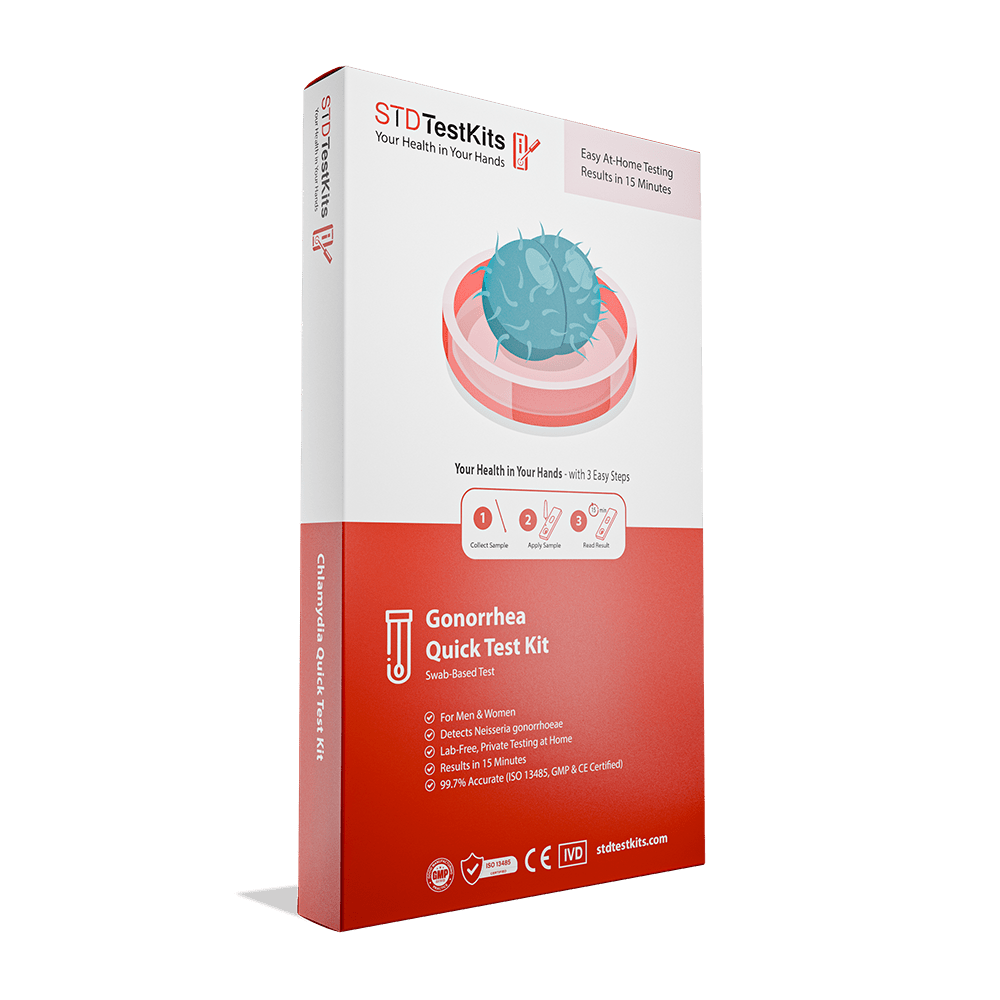6 STDs You Can Catch From Oral, Even If It Feels “Low Risk”
Quick Answer: Teens are catching oral gonorrhea through unprotected oral sex and, rarely, kissing, often without symptoms. Because it mimics sore throats or causes no signs at all, it's easy to miss and under-tested.
“I Thought It Was Just Strep”: The Hidden Signs of Oral Gonorrhea
Kayla, 17, had never had penetrative sex, but she gave and received oral with her boyfriend. A week later, her throat hurt, but she didn’t think much of it. “I figured it was allergies or maybe strep. I even took antibiotics from a friend’s leftover prescription.” It wasn’t until she went to a clinic with swollen lymph nodes that she got tested, and diagnosed with gonorrhea of the throat.
“I felt stupid. Like how do you even get an STD in your mouth? We didn’t do ‘real’ sex.”
But what happened to Kayla isn’t rare. According to the CDC, oral gonorrhea is increasingly common, especially among sexually active teens who don’t consider oral sex to be “real” sex, and don’t use protection during it. Gonorrhea bacteria can live in the throat, tonsils, and even the back of the tongue, often with zero symptoms.
The result? Teens may carry and transmit the infection without ever realizing they were exposed. And because routine STD panels don’t include throat swabs unless specifically requested, thousands go undiagnosed each year.

People are also reading: What to Do After a Positive Hepatitis C Test, No Panic, Just Steps
How Gonorrhea Ends Up in the Mouth (Yes, It Happens More Than You Think)
Let’s break it down: gonorrhea is a bacterial infection that spreads through contact with infected mucus membranes, vagina, penis, rectum, and yes, mouth. During oral sex (especially without barriers like condoms or dental dams), the bacteria can transfer from genitals to throat or vice versa. Once there, it colonizes quietly.
Some teens assume that if they're only giving or receiving oral, they’re not “really having sex.” That mindset leads to skipped condoms and zero STI screening. Add in the rise of hook-up culture, early sexual exploration, and lack of detailed sex ed, and you've got a recipe for silent transmission.
There’s even evidence, though rare, that kissing may play a role. A 2019 Australian study suggested that deep kissing between people with untreated oral gonorrhea could spread the bacteria, though oral-genital contact remains the primary route.
Why Teens Are More at Risk Than They Realize
It’s not about judgment, it’s about biology and behavior. Teens are less likely to:
- Use condoms or dental dams during oral sex
- Ask partners about STD status
- Know that oral gonorrhea exists
- Request throat-specific testing at clinics
Combine that with still-developing immune systems, limited access to healthcare, and stigma around STDs, and it’s no surprise teen oral gonorrhea is underdiagnosed. What looks like a sore throat may be a sign of something more. But if you don’t ask, you won’t get tested, and if you don’t test, you can’t treat.
That’s where awareness matters. A sore throat that lingers, comes with swollen glands, or happens after oral contact should be taken seriously, even without a fever or white patches. Especially if it doesn’t respond to usual sore throat treatments.
Oral Gonorrhea vs. Strep Throat: What’s the Difference?
This is where things get tricky. Oral gonorrhea and strep throat can feel almost identical, until they don’t. The key is in the subtle details, the timeline, and what your body is (or isn’t) responding to.
Table 1. How oral gonorrhea symptoms differ from classic strep throat. Many cases of gonorrhea are misdiagnosed or missed entirely.
If you, or your teen, has a sore throat that lingers or keeps coming back after hookups or oral contact, it’s worth asking: was gonorrhea even tested for? Standard strep tests won’t catch it, and regular STD panels won’t either unless you specifically ask for a gonorrhea throat swab.
How (and When) to Test for Oral Gonorrhea
Testing for oral gonorrhea is easier than most people think. All it takes is a simple throat swab sent to a lab or tested via rapid detection methods. But here’s the catch: you must request oral site testing. Most clinics default to genital screening unless you ask, and many at-home kits don't include throat coverage unless specified.
Here’s the timing you need to know:
Table 2. Testing windows for accurate oral gonorrhea detection after oral sex exposure.
If it’s been less than 5 days, it may be too early to detect. If you’re at day 7 or beyond, you can test now. If your exposure was recent or ongoing, consider a follow-up test in 2–3 weeks. And remember: even if you don’t feel sick, you can still be contagious.
Real Talk: What Getting Tested Actually Feels Like
Jordan, 16, found out his girlfriend had tested positive for gonorrhea after her routine visit. “We’d only done oral. I didn’t think I needed to check. But she told me, so I went to the teen clinic. They swabbed my throat and... yeah, I had it too.”
“Honestly? The swab was nothing. Way easier than I expected. Took 10 seconds. I got the results in two days.”
It’s normal to feel embarrassed. But what’s worse? Not knowing. Gonorrhea in the throat isn’t just a personal health issue, it becomes a public health one when teens pass it unknowingly to others. Most cases clear with a short course of antibiotics, but delays in treatment can cause complications or make the bacteria harder to kill.
The Silent Spread: Why Untested Throats Keep Passing Gonorrhea
This is the real issue: people test their genitals but ignore their mouths. A person can have oral gonorrhea with no genital infection and pass it to every partner through oral sex. Without symptoms or testing, it creates a domino effect, especially in tightly connected sexual networks like schools, parties, or social circles.
Public health data confirms the rise. According to the CDC’s STD Surveillance Reports, gonorrhea rates are up across the board, but especially among people aged 15–24. Throat-based infections are harder to track, but clinicians are seeing more and more “surprising positives” from oral swabs.
“I Didn’t Even Think It Counted”: The Shame Around Oral STDs
Aaliyah, 15, didn’t tell anyone. Not her mom, not her best friend, not even the boy who gave her oral. “I thought only people who were, like, really out there got STDs. I felt gross. I hadn’t even had sex yet.” She only found out after going to the doctor for a throat issue that wouldn’t go away. Gonorrhea.
“I didn’t want to be one of ‘those’ girls. But I was. And I felt like it was my fault.”
Let’s be clear: getting an STD, oral or otherwise, doesn’t make you dirty, reckless, or irresponsible. It makes you human. You had a moment of connection, intimacy, or curiosity. The bacteria showed up. That’s it.
But shame is a strong feeling. Especially for teens, who are already dealing with peer pressure, figuring out their sexual identity, and how they look. Many people don't talk about it, skip testing, or never tell their partners because of the stigma of "mouth STDs." That silence helps it spread.
What Teens (and Parents) Should Know About Prevention
Here’s what’s missing from most sex-ed classrooms: oral sex is sex. It can feel safer, less intimidating, or even like a “loophole” for virginity, but it carries real risk. Here’s how to protect yourself without shame or overreaction:
- Use condoms or dental dams for oral-genital contact, especially with new or casual partners.
- Ask about testing the same way you’d ask about birth control or consent. “When’s the last time you tested?” is a totally fair question.
- Don’t assume no symptoms = no risk. Most oral gonorrhea cases show nothing at all.
- If something feels off, test. Sore throat, swollen glands, or general “offness” after a hookup? Better to know.
And parents? Talk about it. You don’t have to get graphic. Just say this: “Oral sex counts. It can spread STDs, and you won’t always know you have one. No judgment, just use protection, and test sometimes.” That one sentence can save your kid from pain, fear, or confusion later.
When Silence Isn’t Safety, It’s Risk
Oral gonorrhea won’t shout its name. It doesn’t always burn, blister, or scream for attention. That’s what makes it so sneaky. But behind the silence is the risk, not just for the person infected, but for everyone they kiss, go down on, or share intimacy with.
Testing is how we break the cycle. It’s how we turn “I didn’t know” into “I’ve got this.” And in a world where STDs still carry way too much stigma, choosing to test is a radical act of self-care and partner care.
Need privacy? Need clarity? This combo test kit makes it simple to screen from home, throat swab included in some options. No awkward clinics. No questions asked. Just answers.
You’re not gross. You’re not broken. You’re aware, and that’s power.

People are also reading: Got Lucky on Vacation? You Might Not Be So Lucky Now
FAQs
1. Can you really get gonorrhea just from oral sex?
Yep, that’s not a myth. Oral sex can pass gonorrhea from genitals to mouth and vice versa, especially if there’s no barrier like a condom or dental dam. A lot of people think “it’s just head” means it’s risk-free, but the bacteria don’t care how you got there. They just need access.
2. What does oral gonorrhea even feel like?
Most of the time? Nothing. That’s the sneaky part. But if it does show symptoms, expect a sore throat that lingers, maybe some swollen glands or a weird taste in your mouth. Basically, it feels like allergies or strep, but won’t go away on its own.
3. Can you get it from kissing?
Not usually, but maybe. Some studies suggest deep kissing could spread oral gonorrhea between people who already have it in their throats, but it’s rare. Oral sex is still the main route. So unless you’re making out with someone who’s actively infected, it’s not your top concern.
4. Why don’t doctors test for this more often?
Because most STD tests don’t automatically check your throat. If you don’t tell the provider you had oral sex, they’ll usually just swab your genitals and call it a day. Throat testing? You have to ask. (And you totally should.)
5. Can a sore throat be a sign of an STD?
Yep. Especially if it doesn’t come with a fever or if it shows up a few days after oral sex. Think of it this way: if you wouldn’t ignore itching “down there,” don’t ignore irritation in your throat either.
6. Do at-home STD kits test for the throat too?
Some do, but not all. You’ve got to check if throat swabs are included. Our go-to? This combo kit covers oral gonorrhea (if you select the right version). No clinics, no judgment, just mail-in results.
7. I tested positive. Now what?
Deep breath. It’s treatable. Usually, it’s just a course of antibiotics. You’ll want to stay off oral sex for a week, let any recent partners know, and retest if your doc says so. No big moral failing here, just some bacteria doing what bacteria do.
8. Do I need to tell the person I hooked up with?
If you can, yes. Even if it was casual. Even if you’re nervous. A simple “Hey, I tested positive for oral gonorrhea. You might want to get checked too” is enough. You’re not accusing anyone, you’re being responsible.
9. What if I don’t have symptoms, should I still test?
Absolutely. Most people with oral gonorrhea don’t feel a thing. That’s why it keeps spreading. If you’ve had unprotected oral sex and never been swabbed, it’s worth checking. Trust us, peace of mind feels better than wondering.
10. How often should teens or young adults get tested?
If you’re sexually active, especially if you’ve had more than one partner in the last year, every 3–6 months is solid. Oral sex counts. If you’re hooking up, you’re eligible. Testing isn’t overkill, it’s care.
Before You Say “It’s Just Oral,” Think Again
We don’t talk enough about how STDs show up in real life. Especially in the mouths of teenagers who don’t feel sick and don’t think they’ve done “enough” to be at risk. But here’s the truth: oral sex is sex. It can carry consequences, and it deserves real protection, real education, and real care.
So if your throat’s been acting up? If you’ve had unprotected oral sex recently? Or if you just want peace of mind? Grab a home test kit today. No stigma. No judgment. Just clear, confidential answers, fast.
Your mouth deserves the same protection as the rest of you.
Sources
1. Mayo Clinic – Gonorrhea Overview
2. Factors associated with pharyngeal gonorrhea in young people attending public STD clinics — PMC
3. Better education needed about oral-sex disease risk — University of Michigan IHPI
4. Gonorrhea in Teens — Children’s National Health System
5. Gonococcal Infections Among Adolescents and Adults — CDC Treatment Guidelines
About the Author
Dr. F. David, MD is a board-certified infectious disease specialist with 20+ years of experience in STD prevention and adolescent care. He’s known for his no-judgment, trauma-informed approach to sexual health and is committed to helping patients access stigma-free testing options.
Reviewed by: Nina Toussaint, RN | Last medically reviewed: October 2025
This article is for informational purposes and does not substitute for medical advice. Always consult a licensed provider for testing, treatment, or follow-up care.






